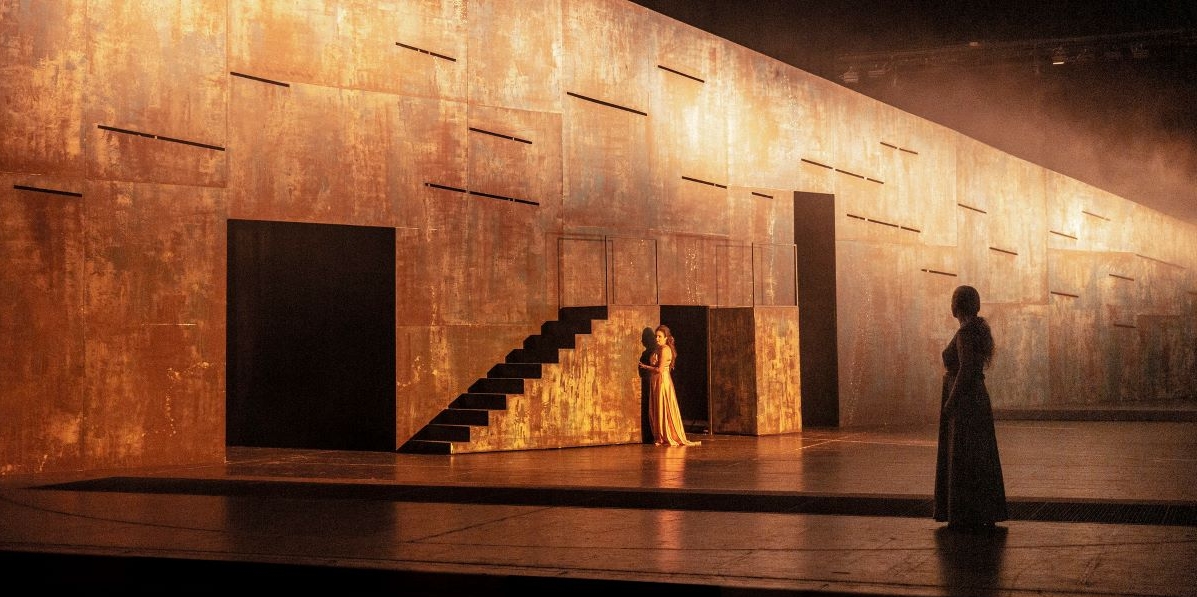Brno has a rich musical culture, with many theatres. Going to the opera is an occasion, and everyone dresses up.
This is a fantastic production made possible by the huge stage of the modern Janacek Theatre. The set, and the way it moved around with the lighting changes, is wonderful. A large empty space with a huge wall changes colour from battle fatigue browns and greens, bronze/gold for Desdemona scenes matching her dress, stark black and white, and reds for the bedroom, contributed to one of the best productions of Otello I have seen. Stairs came in and out when needed, forming the impression of private rooms, allowing for eavesdropping. The love duet scene was especially clever; it started on the huge set, and as Otello and Desdemona came to the front the red bedroom appeared from underneath giving the advantage of intimacy together with more focused sound in the enclosed space.
There are a few oddities; the Act I fight scene where drunk Cassio wounds Montano with his sword – there were no swords. An army without swords? The chorus jumps every time they sing ‘hahaha’ which looks silly and singing whilst jumping doesn’t sound good either. The worst was at the end, after Otello has killed Desdemona (strangled with her wedding veil instead of suffocated with a cushion); the whole final scene when Otello kills himself, singing ‘un bacio, un altro bacio’, was in the dark! The only light through holes in the set, misses the singers completely. If you do not know the opera, you cannot see what is happening.
The drawback of the huge stage is that the sound, if not projected forwards, dissipates.
Verdi’s penultimate work based on Shakespeare’s tragedy of intrigue and jealousy has one of the most exciting starts to any Verdi opera. A huge chorus with solo interjections describes the battle Otello’s ship has to survive in a storm. The excitement must be built by the chorus, who did not deliver. Firstly, they are interspersed around the set, the sound therefore disappears. Secondly, the Italian is very poor. For example, they are all front stage to sing ‘Vittoria’ but unless the double ‘t’ is properly enunciated is becomes a weedy’ vitoria’ and loses all excitement. The sopranos in particular need strengthening; they should soar above everyone else. Brno needs extra chorus brought in to produce the big sound. The regular chorus is not enough.
American lyric tenor Harold Meers is terrific as Hoffman, Rodolfo, Alfredo and similar lyric roles. Otello is a dramatic step up, but Meers is not phased by a role which Pavarotti abandoned quickly! He gives a wonderful performance although a less dramatic sound than some Otello’s. When Otello arrives to sing ‘esultate’, I couldn’t hear him, because he was facing the wings and the sound gets lost ( a staging issue). Meers doesn’t look the fearsome warrior, but an impressive singer and actor. His Italian is excellent.
Georgian baritone Giorgi Mtchedlishvilli as Iago strides the stage in the stance of the late great Hvorostovsky. He is a big man, with a big voice and a wonderful sound in the lower and mid registers, looking suitably evil; but some of the top notes are pushed, the voice stops spinning, obliging him to stop the top note at the end of a phrase early. His ‘e’ vowel is not properly produced; with the ‘e’ problem – ‘credo in un demon’ ‘é poi’ and other phrases are not clean, the voice gets stuck, and the intonation goes. His Italian needs improvement.
Czech soprano Pavla Vykopalová is a Brno favourite. Her Desdemona was beautifully sung and well-acted. The ‘salce’ (willow) scene showed remarkable sensitivity. She looked stunning in her bronze dress, matching the set.
I heard Czech tenor Aleŝ Briscein three days before in Prague’s Armida, and was pleased to hear him again as Cassio. He has is a lovely clear bright voice; he looks and sounds a perfect foil for Otello (despite one wrong entry!) His Italian is good. He won the coveted Thalia award twice, in 2012 and 2014.
Czech mezzo Vàclava Krejĉi Housková has a gorgeous voice and is over-qualified for Emilia. She understandably sings much larger roles in Brno.
The surtitles in Czech and English, were excellent.

